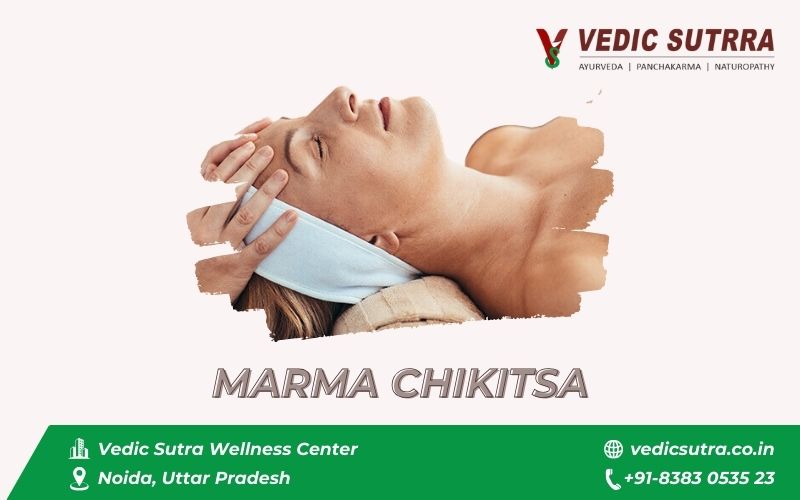
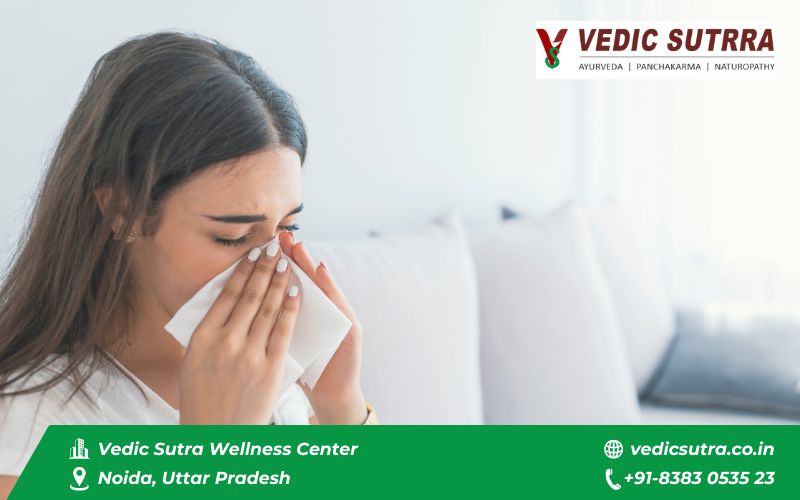
The condition of allergic rhinitis is estimated to affect over 400 million people worldwide and is frequently misdiagnosed or left untreated. In the U.S. alone, it impacts around 10% to 30% of adults and nearly 40% of children, making it the fifth most prevalent chronic condition.
Allergic Rhinitis causes concern globally as it is frequently encountered in the clinic as one of the upper respiratory tract disorders. It is a global ailment and is not limited to a certain age or gender.
Within the Indian subcontinent, nearly 20-30% of the population is reported to suffer from one or the other allergic condition, with allergic rhinitis affecting 20-30% of the Indian population.
Allergic rhinitis (ICD 10 code J30), commonly known as hay fever, is a form of respiratory disorder. It is an allergic disease that occurs as an overreaction of the immune system to certain stimuli or allergens prevalent in the environment. It is triggered by allergens such as tree pollen, grass pollen, weed pollen, dust mites, mold spores, and animal dander.
Allergic rhinitis is classified into two categories:
Conventional allergic rhinitis medicine in allopathy does not offer a guarantee treatment for Allergic Rhinitis, but Ayurvedic medicine does offer a treatment plan that shows promise in alleviating its symptoms. Modern treatments like antihistamines or an allergic rhinitis nose spray provide short-term relief only.
Allergic Rhinitis does get some attention from modern medicine, one could argue that it only offers a very temporary and limited form of assistance.
Ayurveda places great emphasis on the idea of employing indigenous methods in addressing various issues in one’s health. Because of this principle, allergic rhinitis ayurvedic treatment has no side effects, and it could also be an option for managing allergic rhinitis.
As a form of an inflammatory process, allergic rhinitis symptoms present as a complaint of multiple discomforts. These are the most prevalent:
Ayurvedic medicine considers allergic rhinitis from a different perspective than conventional medicine. Ayurveda describes and classifies allergic rhinitis with sneezing, nasal blockage, headaches, shortness of breath, throat and nasal itching, and discharge from the nose, making a total of six symptoms. These allergic rhinitis signs are thought to arise from the toxin “Ama,” which damages the body’s digestive and thermoregulatory systems, and “Ama” in turn weakens the digestive and immune systems. The allergic rhinitis pathology is primarily linked to the Kapha dosha, which manifests as an overreaction in the lower circuits of the central nervous system, in turn overactive hypersensitivity.
Allergic rhinitis management has been assumed to be an easy disorder to manage, and curing it in a shorter time period is often regarded as a challenge. There is an Ayurvedic condition known as Vataja Pratishyaya, which has symptoms corresponding to allergic rhinitis. The effective allergic rhinitis treatment in Ayurveda is based on the Ayurveda holistic approach.
Panchakarma therapy has been successfully used for treating Vataja Pratishyaya, especially the Nasya treatment, which has effective results in allergic rhinitis.
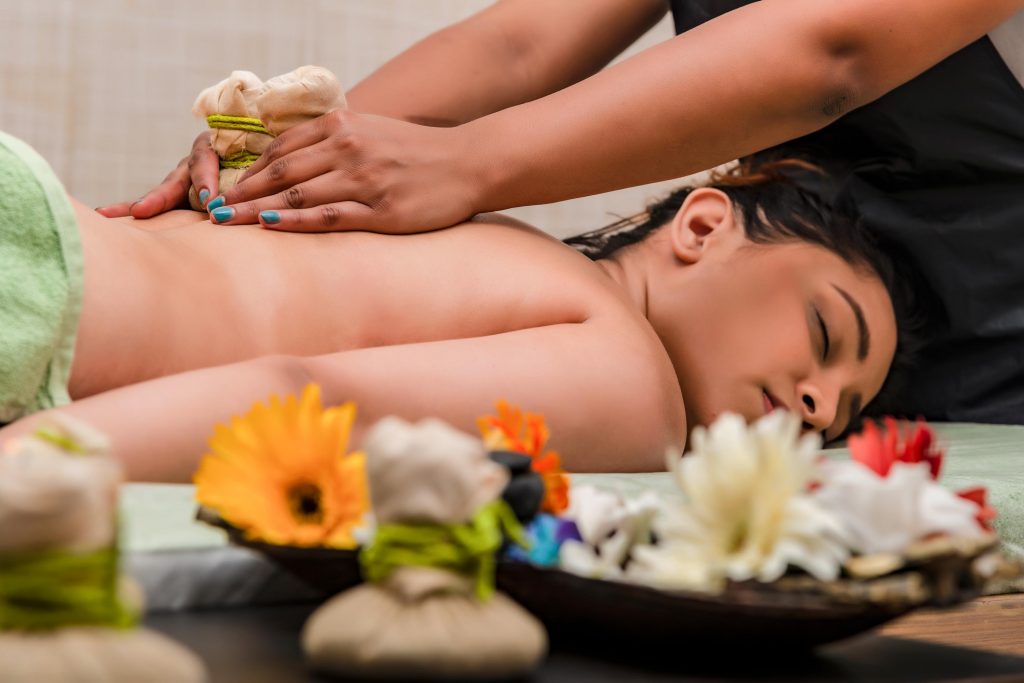
Panchakarma therapy is a holistic method of allergic rhinitis ayurvedic treatment specifically designed for allergic rhinitis. This therapy consists of three essential steps: nasya or nasal cleansing, therapeutic coughing, and detoxing based on dominant dosha. Allergic rhinitis is characterized by an imbalance of kapha and vata doshas, and Panchakarma therapy is designed to restore this equilibrium. This treatment is based on specific therapeutic procedures and herbal medicines aimed to restore the optimal function of the respiratory system.
Panchakarma therapy is composed of distinct sessions, from which the following are derived:
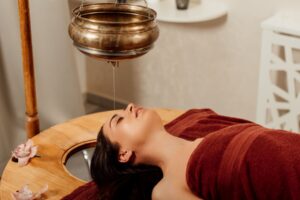
Shirodhara is a therapeutic approach that includes a gentle head and scalp massage, succeeded by pouring warm medicated oil on the forehead. This form of treatment is best applied over a seven-day period for optimal effectiveness. Shirodhara is effective not only for disorders of the respiratory system but also relieves mental stress by restoring equilibrium to the body.
The application of Shirodhara may balance doshas, alleviate discomfort while calming the nervous system and sinus function, offering allergic rhinitis relief.
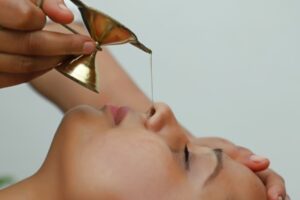
In Ayurvedic Nasya therapy, some oil is applied to the forehead and neck along with gentle strokes for about 10 minutes, which helps to relax the patient and improve blood flow. As part of the treatment, steam with aromatic oils is applied to relax the patient further. Lastly, the herbal therapeutic oils are gently instilled into the nose to relieve blockage and nasal discomfort.
As part of the holistic treatment plan, the patient is instructed to undergo rest, avoid exposure to cold and dust, drink sufficient amounts of water, and follow a well-balanced diet to maintain the holistic benefits of the therapy. This is considered one of the allergic rhinitis best medicine approaches in Ayurveda compared to conventional options like allergic rhinitis homeopathy or sprays.

Virechana is a holistic therapy intended to eliminate bodily toxins while balancing the pitta dosha. This procedure detoxifies the system and also enhances wellness while alleviating allergic reactions. The therapy aims to improve the function of the digestive system and restore pitta dosha balance through Virechana therapy.
The patient undergoes a preliminary phase that includes nutritional and herbal therapy, along with lifestyle changes to prepare the body for the detox program.
The procedure starts with Snehana, an oil full-body massage with herbal oils designed to soften and mobilize toxins, followed by exposing the patient to herbal steam to open the pores and further loosen the toxins. Finally, a specific herbal formula, usually a drink or tablets, is provided to gently induce purging.
Improving the digestive function primarily aims to restore balance to the pitta dosha with Virechana therapy, which in turn helps in conditions like allergic rhinoconjunctivitis.
Some patients prefer allergic rhinitis home treatment such as steam inhalation, honey with warm water, or herbal teas. Others may explore allergic rhinitis treatment in homeopathy, which offers varied results. A consultation with an allergic rhinitis doctor may involve diagnostic methods like allergic rhinitis rhinoscopy and an allergic rhinitis differential diagnosis to distinguish it from sinusitis, asthma, or other respiratory issues.
Ayurvedic treatment effectively manages allergic rhinitis by balancing kapha and vata doshas with specialized Panchakarma therapy. Such treatment alleviates the allergic rhinitis symptoms and simultaneously enhances the person’s well-being by restoring the natural equilibrium of the body. Following Ayurvedic principles, allergic rhinitis treatment in Ayurveda is a practical approach compared to conventional medicine. Whether through Panchakarma, lifestyle changes, or herbal support, Ayurveda offers long-term allergic rhinitis management and relief.
Medical Disclaimer:
This content is intended for educational purposes only. It should not be considered medical advice or used for diagnosing or treating any medical condition. Please consult a qualified doctor or a healthcare professional for personalized guidance.
Get Expert Consultation with
20+ Years Experienced Ayurvedic Physician
Dr. Anu Jaiswal, BAMS, Ayurveda
Call: +91 8383053523
OR Click here to schedule an appointment
Follow Our Social Platform for Regular Updates: Instagram | Facebook | Youtube |